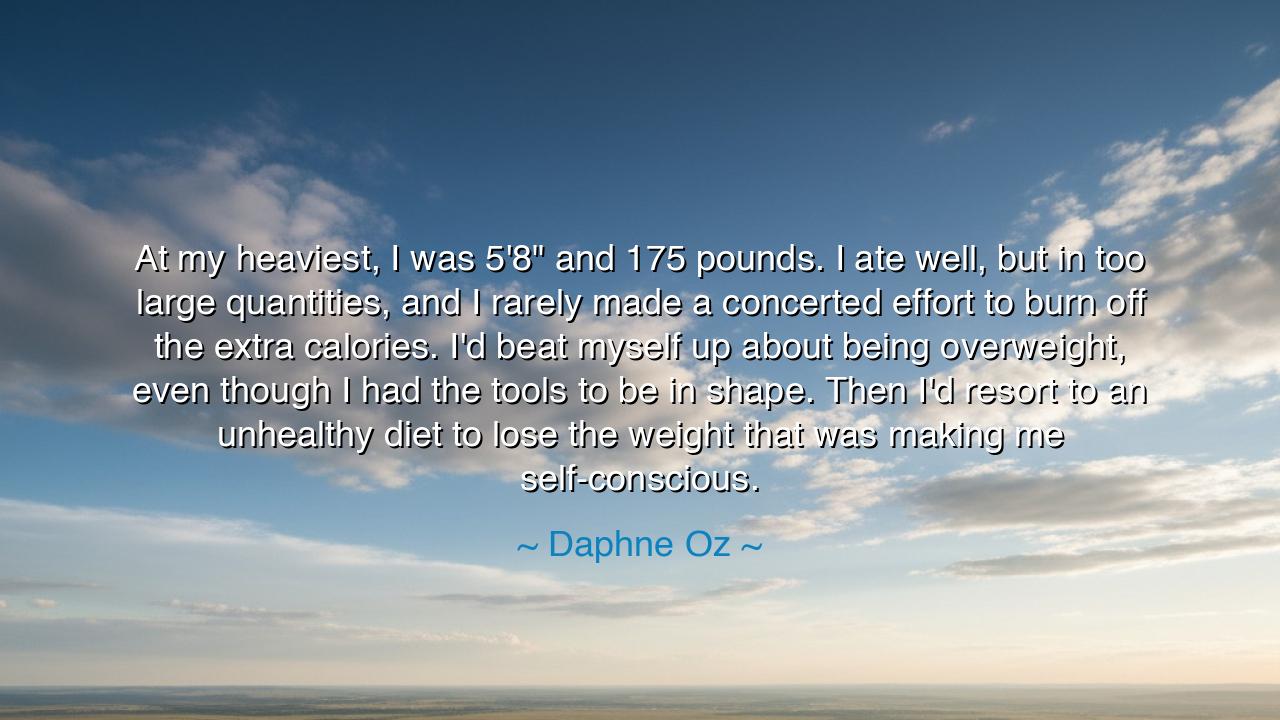
At my heaviest, I was 5'8" and 175 pounds. I ate well, but in too
At my heaviest, I was 5'8" and 175 pounds. I ate well, but in too large quantities, and I rarely made a concerted effort to burn off the extra calories. I'd beat myself up about being overweight, even though I had the tools to be in shape. Then I'd resort to an unhealthy diet to lose the weight that was making me self-conscious.






In the grand scroll of life, there are moments when a soul finds itself caught between the delicate balance of self-doubt and self-care, much like the mighty tree that struggles against the winds, yet longs for the warmth of the sun. It is a battle fought silently within, where the weight of one’s own thoughts becomes as burdensome as the body itself. So too did Daphne Oz, in her own journey, encounter the tempest of excess and the yearning for harmony. She stood, as many of us do, at the crossroads of desire and discipline. At her heaviest, she was 5'8" and 175 pounds, a figure of self-consciousness yet brimming with untapped potential.
In her own words, Daphne confesses, "I ate well, but in too large quantities." How many among us have not also tasted the fruits of indulgence, delighting in the pleasures of the flesh, yet forgetting the true meaning of nourishment? To eat well is not merely to consume food in abundance, but to feed the spirit, to fuel the body for its greater purpose. It is the quantity that clouds the quality of the nourishment. So many find themselves lost in the fleeting joy of excessive indulgence, unaware of the toll it takes on the temple that is the body. It is an age-old temptation, one that has haunted men and women throughout the ages.
But what is more, Daphne reveals that she “rarely made a concerted effort to burn off the extra calories.” In this simple truth, there lies a profound lesson. For in life, as in nature, there must be balance. The great philosopher Aristotle taught us that virtue lies in moderation, and so too does the path to true well-being. To receive sustenance without offering effort in return is to neglect the laws of nature. Just as a river cannot run freely without its banks, nor can the body flourish without movement and exercise. The neglect of this balance is not a curse but a warning—a call to those who are willing to listen.
Daphne’s words speak of a constant struggle, one where she would "beat herself up about being overweight," knowing full well that she possessed the tools to shape herself differently. This is the painful irony of our modern plight: we often hold the power to change, but the battle lies not in the hands, but in the mind. The self-inflicted torment of not meeting one’s expectations is a heavy burden. Yet, the tools of transformation, like swords forged in fire, are often right within our grasp. What hinders us is the mental weight of self-criticism, the belief that we are unworthy of change. This is a trap that many fall into, one where guilt and frustration cloud the path to personal growth.
And so, like many before her, Daphne sought a solution in an unhealthy diet to shed the weight she loathed. In this pursuit, she mirrors the story of the legendary Greek hero Hercules. The hero, beset by the demands of others and his own struggles, often found that his path to redemption was fraught with extremes. He sought quick fixes, just as many of us do, hoping to conquer the demons of excess in one fell swoop. But the journey to transformation is not through harsh austerity or instant results; it is through patience, steadfastness, and the understanding that true change is a gradual process, like the sculptor’s chisel working on the marble.
Consider the words of the ancient poet Ovid, who warned, "The greatest wealth is health." What Daphne's tale teaches us is that we must seek wealth not in fleeting moments of indulgence or extreme restriction, but in the consistent effort to care for the body in a way that honors both its physical and spiritual needs. The path is neither one of abstinence nor overindulgence, but of mindful living—a life where each meal is a gift, each movement a prayer, and each moment of self-reflection an opportunity for growth.
The lesson, dear reader, is clear: the struggle is not external but internal. We are the architects of our own well-being. In every action we take, we have the power to either nourish or diminish our inner harmony. The practical path forward is simple: nourish your body with intention, seek movement that honors it, and silence the voices of guilt and self-doubt. Build a life of balance, where effort and reward are aligned. And when you falter, as all do, remember that the true measure of a person lies not in their imperfections, but in their resolve to rise again.
And so, as you stand at the crossroads of desire and discipline, remember the words of the wise: the path of transformation is not found in extremes, but in the steady, intentional care you give to your body, mind, and soul. Let each day be a victory in the quiet battle for balance, and let your life be a testament to the strength that comes from the harmony of all that you are.






AAdministratorAdministrator
Welcome, honored guests. Please leave a comment, we will respond soon